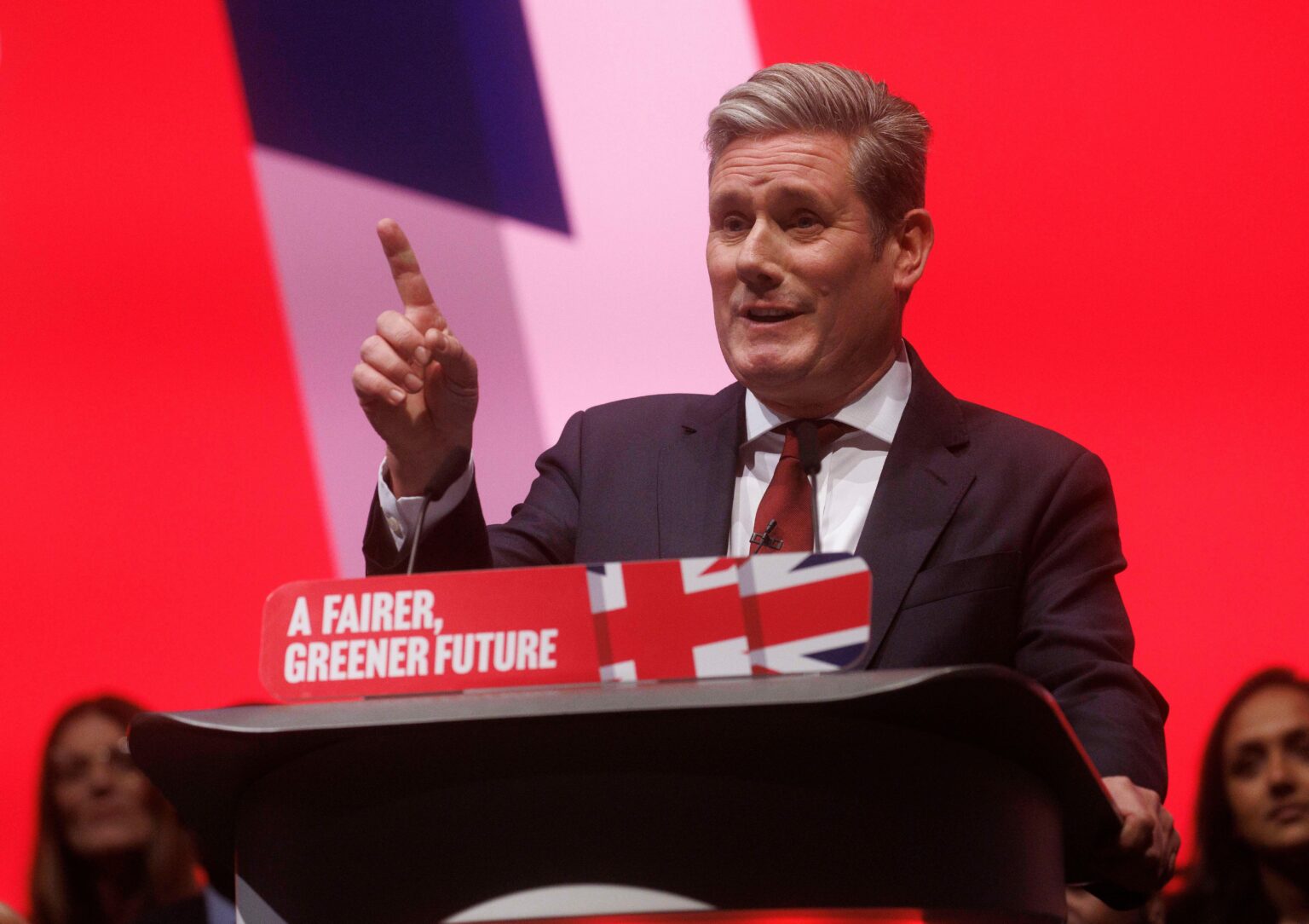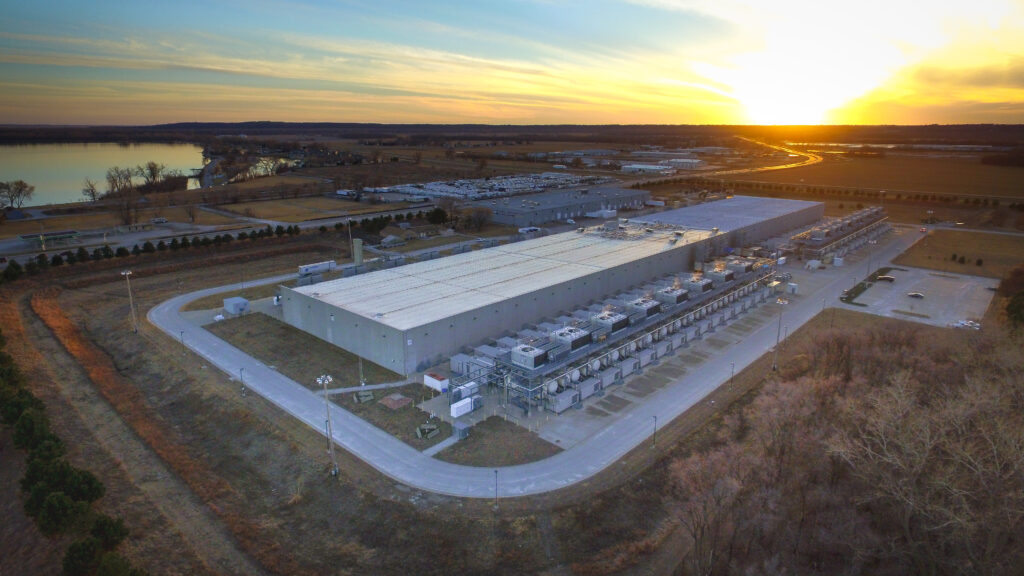This year’s Labour Party conference will feature events sponsored by an oil and gas trade group, the owner of the UK’s largest emitting power plant, and a gas distribution company, DeSmog can reveal.
The conference, which is being held from 22 to 25 September in Liverpool, is one of the largest political gatherings in Europe and will feature set piece speeches from Labour’s newly-elected Cabinet ministers.
Although the full conference agenda is yet to be released, the New Statesman magazine has published a list of firms that will be sponsoring its panel events. These include the controversial energy company Drax, the fossil fuel lobby group Offshore Energies UK, and the gas company Cadent.
Labour, which has been in power for less than three months, has already unveiled an ambitious raft of policies to tackle climate change, including plans to decarbonise electricity by 2030, facilitated by a state-owned company GB Energy.
Robert Noyes, Fossil Free Parliament campaigner, told DeSmog that the New Statesman was “selling its readers short” by accepting sponsorship from polluting companies and their lobbyists.
He added that “Labour must not allow its energy programme to be further captured by corporate interests. It pollutes our politics and dilutes their agenda… Climate wrecking sponsors have got to go.”
Subscribe to our newsletter
Stay up to date with DeSmog news and alerts
Labour’s annual conference hosts dozens of fringe events organised by external groups, which tend to feature a panel of speakers – including a representative from the corporate sponsor. All the events hosted within the official conference zone are reviewed and approved by the party.
“No other partnered event will get you as close to the biggest names and most important conversations in Labour politics,” the New Statesman says about its 2024 agenda.
The party faced protests at its conference in 2022, when the New Statesman hosted a debate on Britain’s net zero climate goals sponsored by Drax. The firm’s plant in Selby, Yorkshire, which burns wood pellets to generate electricity, is the single biggest source of carbon dioxide emissions in the country according to the climate think tank Ember. Drax disputes this claim.
Drax has received state subsidies worth more than £7 billion since 2012, and the government is currently considering whether to extend this financial assistance beyond 2027 so the firm can build facilities to capture and store carbon emissions.
The Labour Party accepted a £12,000 donation from Drax in September 2022, while the company has frequently sponsored events at both Conservative and Labour conferences.
The New Statesman is one of a number of major media companies to have come under fire for boosting the profiles of polluting companies through commercial partnerships. An investigation by DeSmog and Drilled previously revealed that many of the world’s most trusted English-language news outlets regularly promote the fossil fuel industry’s narratives on climate-related topics.
In May, former Green Party MP Caroline Lucas pulled out of the New Statesman’s energy and climate change conference over its sponsorship by the oil company Equinor. Days later, Labour MP Alex Sobel, who chairs the All-Party Parliamentary Group on Net Zero, also withdrew from a Politico energy and climate summit due to its Equinor sponsorship.
Drax, Cadent, OEUK, the New Statesman, and the Labour Party were approached for comment.
Drax
A number of investigations have shown that Drax harvests wood from some of the world’s most precious forests.
In August, the firm agreed to pay £25 million following an investigation from the energy watchdog Ofgem found that Drax had failed to supply enough evidence about the type of wood that it imports.
Drax says that its electricity is “carbon neutral” given that trees can be planted to reabsorb emissions – a claim that has been disputed by climate experts. More than 500 scientists signed a letter in 2021 stating that it would take decades for the carbon emitted by burning wood to be balanced with the planting of new trees.
The New Statesman published a sponsored article from Drax in May, written by the executive in charge of the firm’s bioenergy with carbon capture and storage (BECCS) project, claiming that it will “make a sizable contribution to the UK’s climate change targets”.
Almost all of the net zero emissions pathways modelled by the UN-backed Intergovernmental Panel on Climate Change (IPCC) and the International Energy Agency envision huge deployments of CCS technology by the middle of the century.
However, as DeSmog has shown, most large-scale CCS projects underperform or fail to meet their capture targets. As the November 2023 Production Gap Report, produced by climate experts, pointed out: “the track record for CCS has been very poor to date, with around 80 percent of pilot projects over the last 30 years ending in failure.”
Sally Clark from the campaign group Biofuelwatch said it’s “deeply concerning” that Drax is set to sponsor a fringe event at the Labour conference.
“Events like these give Drax the opportunity to influence decision-makers and greenwash its planet-wrecking tree burning at a time when the government is considering whether to grant huge new subsidies to continue funding Drax’s harm to forests, wildlife, communities and the climate,” she added.
“If we are to prevent the worst impacts of climate breakdown, we need to kick big polluters like Drax out of our politics and instead invest in real climate solutions, such as wind and solar power, and protect the world’s best carbon-storing technology – trees.”
OEUK
Offshore Energies UK (OEUK) is set to join Drax as a sponsor of the New Statesman’s 2024 Labour conference agenda. OEUK is the “leading representative body” for the country’s oil and gas industry, while its members include some of the world’s largest fossil fuel companies, such as Shell, ExxonMobil, and Equinor.
The group lobbies the government, both in public and private, to enact policies that benefit oil and gas companies.
DeSmog previously revealed that OEUK and its members met with ministers over 200 times in the year after the 2022 Russian invasion of Ukraine as part of a lobbying blitz to undermine the proposed windfall tax on energy company profits. The tax was launched in 2022 but contained loopholes including tax relief on investments in UK fossil fuel extraction.
OEUK has vocally opposed Labour’s policy of extending the windfall tax from 75 percent to 78 percent until 2029, claiming that it could cost 42,000 jobs – a figure that has been disputed by experts.
The group’s CEO David Whitehouse even went so far as to accuse Labour of being unable to “do the maths” over its windfall tax plans. Labour has also said that it won’t be granting any new North Sea oil and gas licences – a policy that has likewise been criticised by OEUK.
This isn’t the first time that the New Statesman has accepted sponsorship from OEUK. The lobby group sponsored a Labour conference event in 2023 hosted by the magazine and attended by Sarah Jones, Labour’s then shadow minister for decarbonisation and industry (who now holds this role in government).
“Cash-strapped media are increasingly easy prey for climate wreckers eager to launder their reputations,” said Robert Noyes. “When outlets like the New Statesman take funding from such lobby groups like OEUK, they sell their readers to the interests of that lobby.”
Cadent
The UK’s biggest gas distribution network, Cadent, which provides fuel to 11 million homes and businesses, is also listed as a sponsor for the upcoming conference.
Gas boilers are used to heat around 85 percent of UK homes, which together produce 14 percent of the UK’s greenhouse gas emissions.
Cadent sponsored a New Statesman event at last year’s Labour conference, attended by the firm’s chief strategy and regulation officer, Tony Ballance.
In response to a question from DeSmog, Ballance advocated for the role of hydrogen in home heating, and claimed there was “limited” scientific evidence opposed to the deployment of the fuel.
The gas industry has championed hydrogen as a replacement for gas in heating, arguing that it can easily replace existing methane gas and can use existing pipelines to transport and store the fuel.
However, heat pumps are up to five times more efficient than gas boilers according to the International Energy Agency, and can be run on electricity generated via renewable energy sources. A peer-reviewed assessment of over 50 independent studies in 2024 concluded that hydrogen use in domestic heating is inefficient, costly and resource-intensive compared to other low-carbon options such as heat pumps.
It is possible to produce ‘green’ hydrogen using solar and wind, which is widely seen as an important way to decarbonise industrial processes where it is hard to avoid greenhouse gas emissions. However, the overwhelming majority of hydrogen – around 95 percent worldwide – is currently produced using fossil fuels.
Even so, the gas industry has cast doubt on heat pumps, while talking up the merits of hydrogen.
An investigation by DeSmog in July 2023 found that the Energy and Utilities Alliance (EUA), which represents the vast majority of the UK’s gas boiler manufacturers and distributors – including Cadent – had paid for an extensive negative PR campaign to “spark outrage” against heat pumps in the British press.
Cadent was one of two gas networks to win a government contract to trial hydrogen for home heating ahead of the government’s decision on the policy, expected in 2026. But plans for the village of Whitby in Cheshire were scrapped in July after a sustained local campaign, which raised concerns over the safety of hydrogen in homes.
Subscribe to our newsletter
Stay up to date with DeSmog news and alerts






